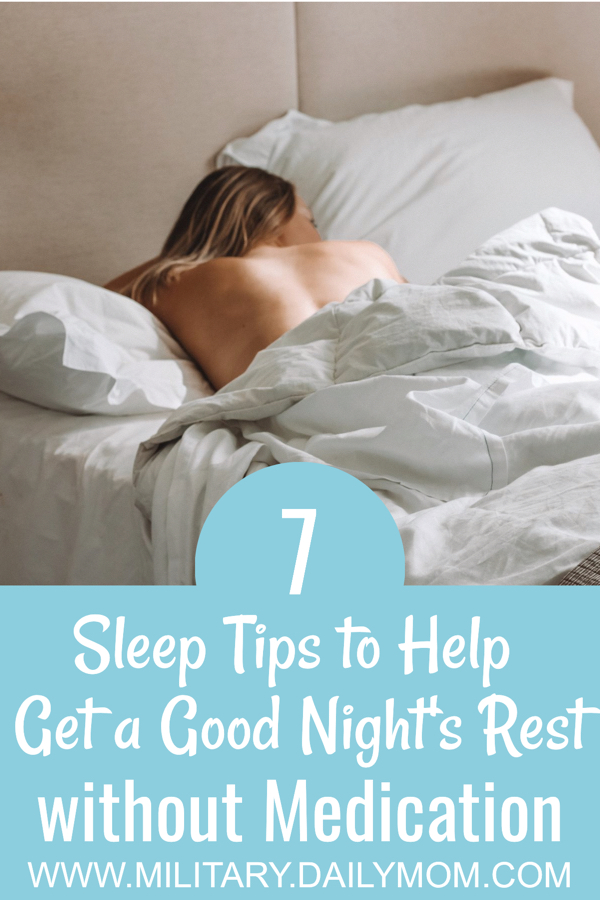When was the last time you got a good night’s sleep? We thought so. Approximately one-third of adults in the United States usually get less than seven hours of sleep per night. Sleep deprivation is dangerous, as we’ve seen inside and outside of the military community.
Adults need seven to nine hours of quality sleep per night, which is important for mood, energy, and overall health. Getting enough quality sleep can be especially challenging when struggling to fall asleep, stay asleep, or return to sleep after waking. This is why sleep tips are so important!
IMPORTANT: Difficulty breathing at night, which may cause awakenings from sleep, is a serious medical condition that must be treated by a qualified physician.
Trouble falling asleep and waking in the night can be caused by an active or alert mind. The following sleep tips help you to fall asleep faster, stay asleep longer, and return to sleep.
7 Sleep Tips to Help You Get a Good Night’s Rest
1Manage stress throughout the day.
If you’re having difficulty falling asleep or staying asleep, it could be caused by stress. Relaxing right before bed is often not enough to counter the stress that builds up all day long. Reducing stress throughout the day can help to improve sleep at night.
2Create and follow a bedtime routine.
And we don’t mean the kind that involves binging the latest Netflix show. We mean actually relaxing and putting down the phone! This should take place during the last 30 minutes before bed and can include things like dimming the lights, taking a warm bath, calming stretches, and breathing exercises.
3Keep a regular schedule of sleep and wake times.
When possible, it is best to go to bed and wake up at the same time every day with no more than 30 minutes of variation so the brain can acclimate to the routine and be ready for sleep at the scheduled time. This includes weekends. It is better to take short naps of 20 minutes or less in the morning than to sleep in past the regular wake time in an attempt to catch up on sleep.
4Prioritize sleep.
It is common for the daily to-do list, unfinished work, or other activities to take priority over the scheduled bedtime, especially with the unpredictability of child needs and sometimes frequent solo parenting of military life. This creates additional problems as it prevents following a regular sleep schedule and the benefit of the routine. It can also leave less than the needed time for sleep when it is not possible to wake up later.
RELATED: The Signs of Sleep Deprivation and How to Avoid It
An example: The kids may wake up or the alarm may go off five hours after going to bed, making it impossible to get eight hours of sleep. While it may seem as if this would create enough drowsiness to fall asleep fast the following night, it can have the opposite result when being overtired leads to a “second wind” shortly before or at bedtime, making it difficult to fall asleep. You know how your toddler acts when they’re overtired, we don’t want that for you either.
5Calm the body and mind before bed.
One technique to calm the mind and body is to think about calming the mind and body. This can be done by sitting comfortably, closing the eyes, breathing deeply, thinking about relaxing muscles, and visualizing the body and mind getting deeply relaxed. Try this free guided relaxation exercise.
6Get out of bed if unable to fall asleep within 10-15 minutes.
Lying in bed awake can reinforce sleeplessness as the brain begins to associate the bed with being awake. If sleep does not come after 10-15 minutes of being in bed it is best to get out of bed until sleepy enough to fall asleep. This time should be spent doing something relaxing, without any electronic devices.
7Seek support from a trained professional.
These sleep tips may work to address short-term, or acute, insomnia. However, those suffering from long-term, chronic, or more severe insomnia may require further support.
Chronic insomnia is defined as difficulty falling asleep or staying asleep three or more nights per week for three months or longer. Cognitive-behavioral therapy for insomnia, or CBTI, is the treatment of choice for chronic insomnia. A trained CBTI professional may be beneficial if these sleep tips are not enough to get sleep back on track.
Sleep is important, for your health and your mental well-being. These sleep tips are a great place to start when you’re struggling to fall asleep or stay asleep. Sweet dreams!
WANT TO READ MORE?
Check out 9 Ways to Help a Mom with Postpartum Depression!

CONNECT WITH DAILY MOM
💖 NEWSLETTER: DAILY READS IN YOUR INBOX 💖
Sign up to receive our picks for the best things to do, see and buy so you can relax and focus on more important tasks! Let us help you be the best version of yourself you can be!
BE SOCIAL WITH US
📌 LOVE IT? PIN IT!📌
Resources: Centers for Disease Control and Prevention, National Sleep Foundation














































